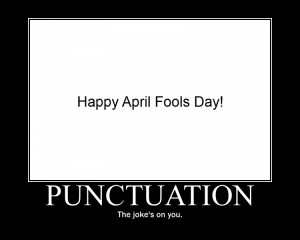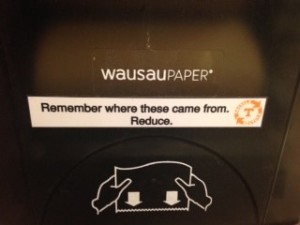3 Common Grammatical Blunders That Will Make You Look Foolish Year-Round
Ah, April Fools’ Day. The day those of us with trickster co-workers have to be on guard from the moment we grab our morning coffee until the time we clock out and go home. There’s one in every office: the trickster who gets a rise out of crossing office phone lines, changing your computer’s system language, or using the copier as a weapon of sweet workplace revenge (what, you didn’t think of those?). No one wants to look foolish, especially in the workplace.
In remembrance of this, the most hallowed of days for the water cooler jester, let us pause to reflect on three of the most common grammatical errors that can cause you or your company to look awfully foolish on this or any other day of the year. Remember to keep these commonly botched grammatical points in mind next time you send out that office-wide memo or worse, a business proposal aimed at an outside company.
1. Bungled Apostrophes
The apostrophe [‘] is used to indicate possession or to combine two words into a single contraction.
- Possession: That Gary really pulled a number on Mara’s nerves with his Jell-o stapler prank.
- Contraction: She would’ve done well to pop him a quick one!
- April Fool apostrophe use – adding an unnecessary apostrophe to a plural noun: She screamed like she saw fifty spider’s.

2. Fewer vs. Less
This one’s a real stinker. Remember that “few” and “fewer” should only be used to refer to things that one can actually quantify or count. Less is used to refer to hypothetical values or things that can’t be numbered.
- This office could really use fewer employees. Hopefully the boss will get rid of the water cooler prankster.
- He’d be less inclined to fire him than to give him a stiff warning.
- April Fool apostrophe usage: We could really use less employees; I hope our boss gets rid of the foolish-sounding copywriter!
3. Ending Sentences With Prepositions
This one will really put your back up if you consider yourself a bit of a grammarian. Still, we see it all the time. While the case can be made for ending a sentence with a preposition when there is simply no way to restructure it without sounding doctrinaire, giving this one a little extra focus can really up your grammar game.
Simply speaking, prepositions are parts of speech that indicate either time or place. Prepositions come in many forms: at, in, during, and from are all common examples.
- From where are you calling?
- It happened during the lunch break.
- At what time were we released?
- In which conference room is the meeting scheduled?
- For an April fool preposition usage, see this surreptitiously snapped example:
And there you have it. While I can’t guarantee following these rules will prevent you from looking like a fool the whole year, I can say with certainty that at least your writing will read better as you compose your angry email to your prankster coworker who just glued the stapler to your chair. Three cheers for April Fools’ Day!


